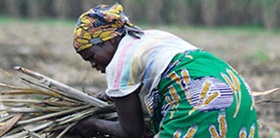Kasinthula Cane Growers’ Association (KCG) is a smallholder sugar cane project located in southern Malawi.
About KCG
In Malawi, long droughts occasionally result in famine, and the twice-yearly rains often bring floods. Literacy levels are low and poverty is widespread. Most people live in basic mud huts with thatched roofs and few can afford to keep livestock. Families eke out a living growing maize, cassava or rice, while others earn cash from sugar cane or cotton, or by labouring on nearby sugar plantations.
I understand that Fairtrade is all about business. It means that we get an extra payment by the Premium and access to international markets.
Alfred Buta, Kasinthula Cane Growers’ Association
KCG was set up in 1996 as part of a joint venture with the Malawi government and a nearby sugar mill, now operated by Illovo Sugar. An area of largely unproductive land was converted to sugar cane production to increase the supply of raw cane to the mill while providing an income for 282 subsistence farmers. The initiative now also provides employment for nearly 800 permanent and seasonal field workers.
Fairtrade Premium
KCG receives a Fairtrade Premium of $60/tonne for all Fairtrade sales. Premium funds have been invested in improving productivity and in healthcare, clean water, education and other projects to alleviate poverty in the community. For example:
- A new primary school allows children to start school when they are five years old. Previously, they had to wait until they were seven or eight, when they were old enough to walk the long distance to the nearest school.
- Six computers and three printers have been donated to local high schools and children’s school fees are paid.
- 18 boreholes have been dug and now supply clean water to local villages, and an exciting water project provides tap water to homes in Salumeji village.
- Drugs to treat bilharzia (a chronic parasitic disease) are donated to the Kasinthula Bilharzia Clinic, which has now been extended into a full healthcare clinic, with a house for a resident clinical officer.
- Four bicycle ambulances have been purchased. These bikes are adapted to pull specially designed trailers as a cheap and simple way of transporting patients for treatment.
- KCG has supported a government project to make electricity available for the first time to 82 households, enabling farmers to buy radios and televisions and fridges to keep food fresh in the tropical heat. Electric lighting makes it easier for children to do their homework at night.
- Most members have replaced leaky grass-thatched huts with brick-built houses with corrugated iron roofs.
- Cane fields have been replanted to improve yields and increase farmers’ incomes.
- An EU grant of £150,000, matched by KCG, has been secured to expand production by 400 hectares. This will enable a further 200 farming households to join and significantly improve their standard of living by growing sugar cane.
